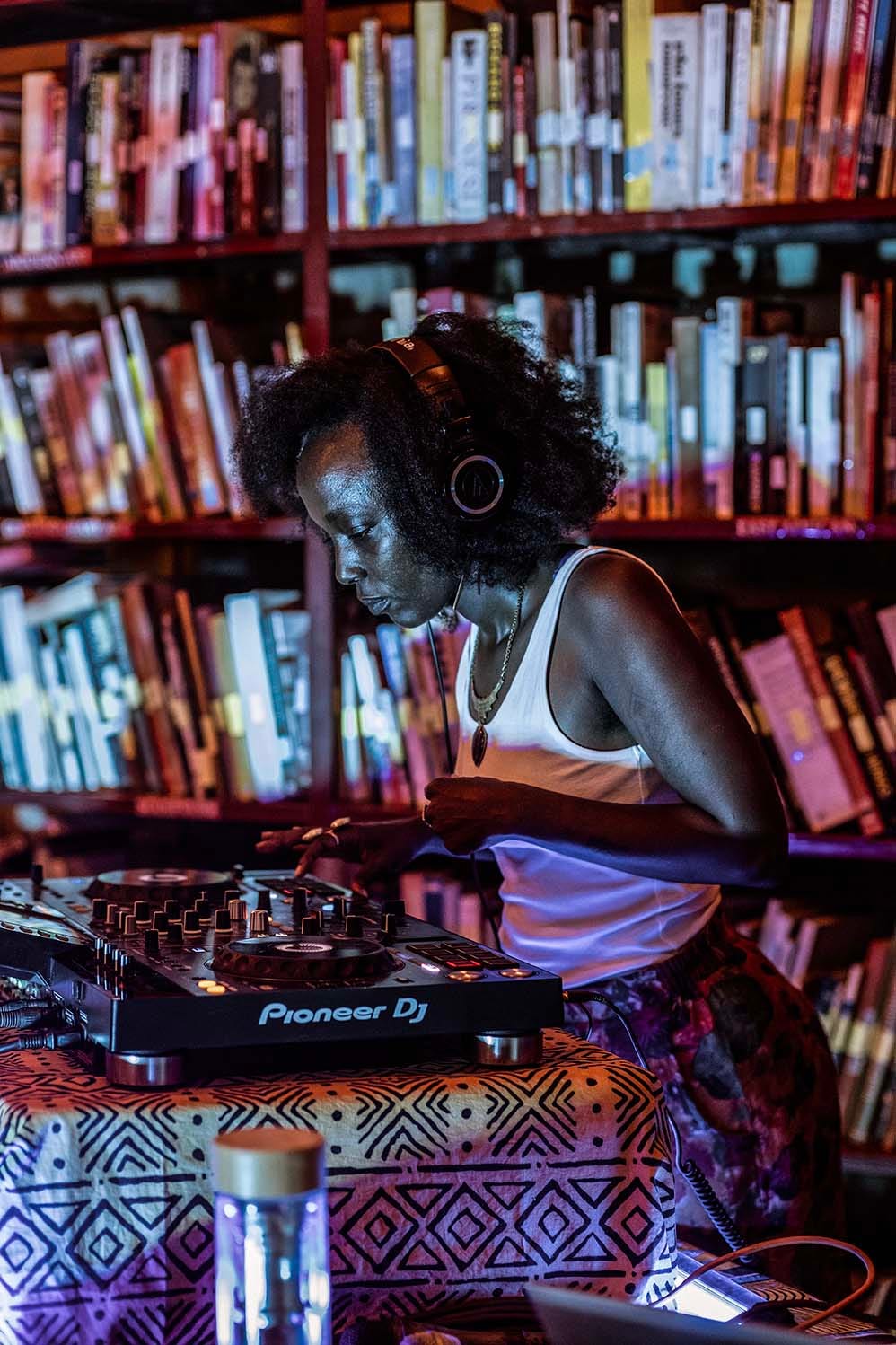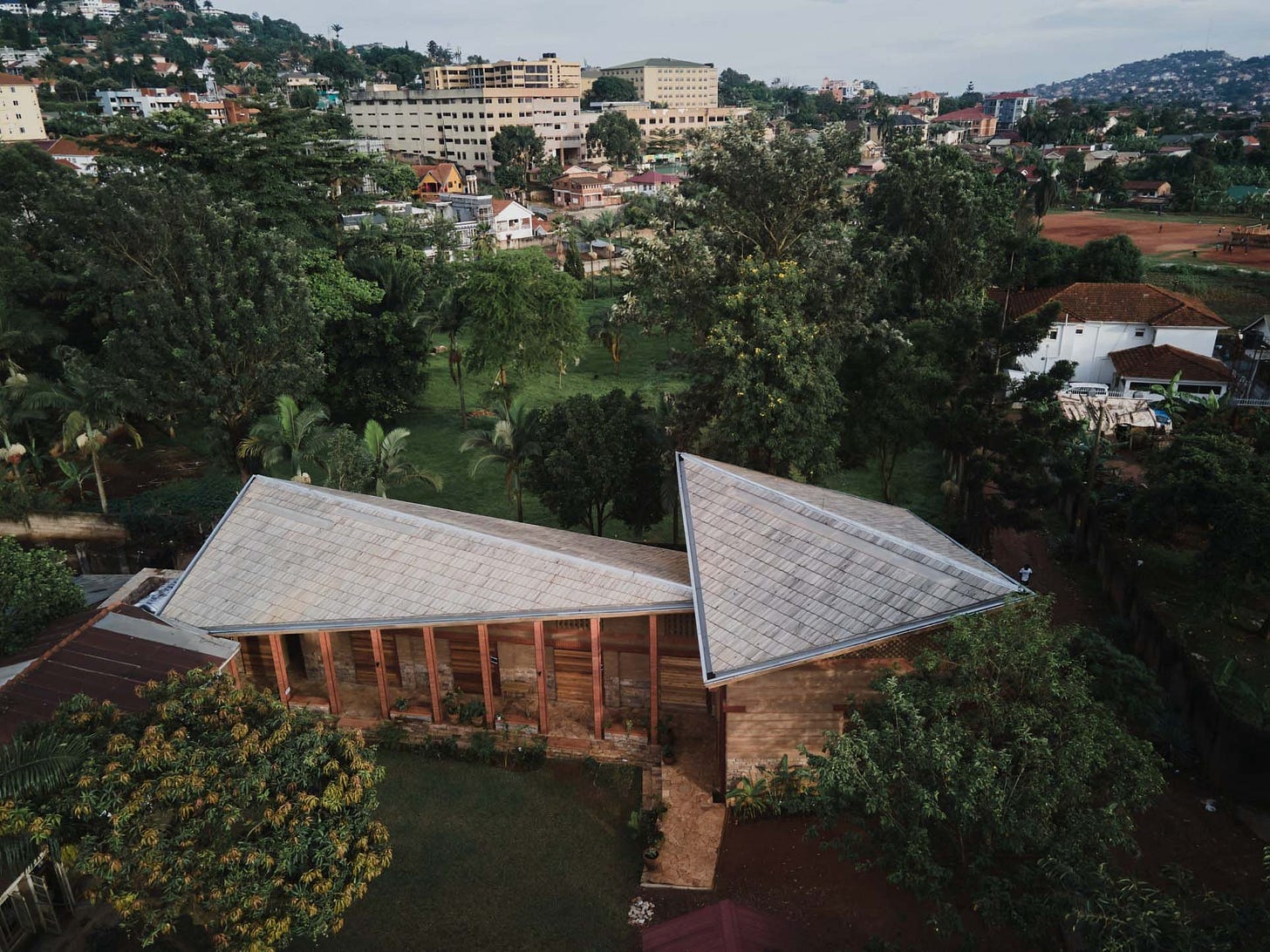A 24-hour rave to build Uganda’s first contemporary art centre
‘The antidote to despair is to do something. And to do it with your friends and community.’
Hannah Uguru
Kampire and Decay have just played a 24-hour back-to-back set. But the DJs want us to think about buildings, not the feat itself. The 23 to 24 May set, dubbed Fundraza 2, was livestreamed globally via Mixcloud and YouTube from 32° East, a contemporary art centre still under construction in Kampala. The venue was packed. Children from the neighbourhood were dancing to the final hour. Friends brought food and coffee. Volunteers ran the bar and cleaned up bottles.
“It’s the kind of space everyone feels at home in, and has a stake in what’s going on,” says Kampire.
At an overseas party in Brussels, 200 people showed up to dance to the livestream. A total audience of around 1,200 showed up throughout the day from places as far flung as Kenya, Japan, Brazil and Scotland.
“I definitely expected that there would be times when there was nobody watching, but that didn’t happen at all. The numbers literally kept climbing throughout the 24 hours,” Kampire says. “There was always someone there – friends, strangers, people from all over.” The party was both hyperlocal and international.
“We were really supported. People would come in and donate for requests and shout-outs,” adds Decay. “And people on the livestream were doing this as well. It was just really nice. When your energy dipped, there was always some new exciting thing to keep you going.”
The DJs were supporting a bid by 32° East to raise $100,000 to complete its construction. With that money, says the centre’s director, Tessa Bahana, they will build six studios, accommodation to host up to 24 artist residences a year, a café, workshops, an arts supplies shop, and an expanded library.
The centre, which in 2021 crowdsourced $96,000 to break ground and build three shared studios and an exhibition space, is already an unusual institution in Uganda. The new facilities would make it the first and only one of its kind in Uganda: a permanent one-stop home for artists and connoisseurs to make, support and commune around art on a daily basis. And itself a monument to what self-built cultural infrastructure looks like.
With limited communal facilities, Ugandan artists tend to work in isolation or congregate around the National Theatre – a colonial era state-owned institution that is often surveilled and sabotaged by its benefactor.
Visual artists in particular were for a long time relegated to packed stalls in the backyard of the National Theatre and a couple of Kampala tourist markets, as public art institutions like Nommo gallery were commandeered by state-connected artists and private galleries struggled to stay alive.
International diplomats sometimes support artists to exhibit in secluded high society spaces and in one case supported the building of Ndere Centre, a quasi-private institution for performing artists. But rich countries are now cutting soft power spending, and even before their retreat, their support didn’t stretch far enough to cover the full depth and diversity of artistic work.
A radical reimagining
Tired of waiting on government grants or donor cycles, the two DJs put their bodies — and music — on the line.
“There were definitely moments during the weeks running up to the 24hour stream, where I was like, ‘why did I have this idea? Why did people agree to do this? Why didn’t anyone tell me no?,’” Kampire jokingly lamented two days after the set. “But now that we’ve done it, it was definitely worth it,” she chuckled and Decay joined in. “It’s a great way to rally people in your physical space, but also to support us from everywhere and get new people involved,” added Kampire.
If this sounds extreme, it’s because it is. But Decay and Kampire are no strangers to unconventional action. They are members of the Nyege Nyege collective, known for Uganda’s biggest annual music festival. Its queer-affirming atmosphere triggers moral panic in the national Parliament each and every year. Last weekend’s 24-hour set was the sequel to one the pair did to support the 2021 campaign.
The centre is personal for Decay who also works as its programmes manager. “My artistic career was and is very entwined with 32° East. I don’t know if I would be a practising artist without the support that I got here,” she said. “I had my first artistic residency at 32° East. I also participated in the public arts festival, Klaart Festival, and some of the work I made during my residency was sold at an art auction series that the centre used to run,” she added.
It is just as personal for Kampire, whose sister, 32° East director Tessa, has nurtured the centre as a labour of love for nearly a decade.
Not bad for a weekend shift
The DJs raised over $1,500 during the livestream alone and donations kept rolling in from the Brussels event and the wider campaign, which ran until Friday, 30 May. By mid-week, the campaign had passed the $36,000 mark. For Kampire and Decay, “just sending out emails and Instagram requests” wouldn’t have done it. It took something people could physically or emotionally show up for to pool together that kind of money.
It did take a toll. “The second day after that, I just was so quiet, so subdued. I had no energy,” Decay laughs. “I felt like I had just run myself out,” she added.
The 32° East team doesn’t plan on needing a Fundraza 3. The current campaign is intended to be their last major crowdfunding effort before transitioning into a fully self-sufficient model.
But the DJs hope their feat energises other dreamers. “The only antidote to despair is to do something. And to do something with your friends and your community,” says Kampire.




